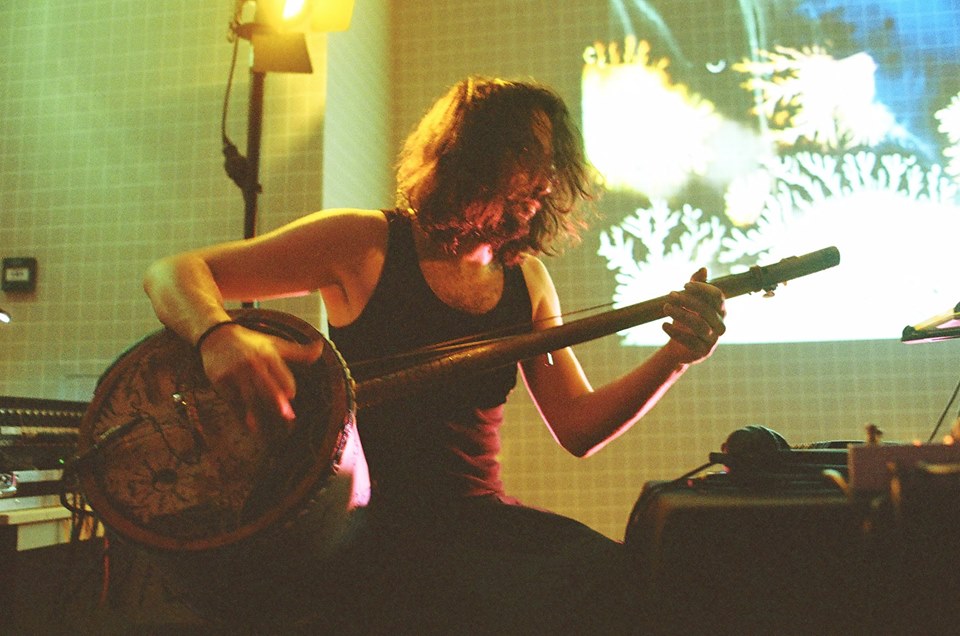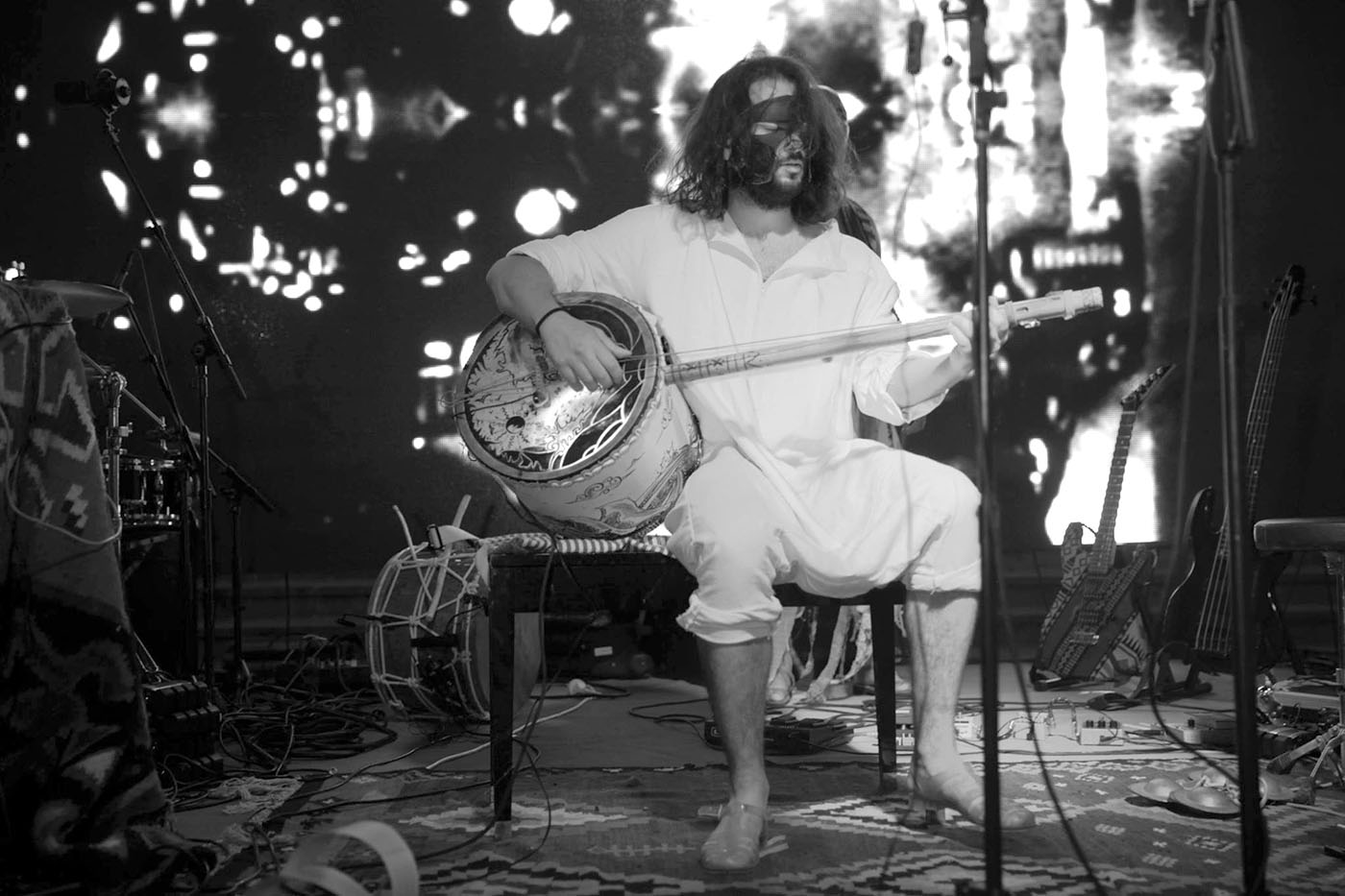Melissa Chemam
Last month, attending the preview of the TV series Raï Is Not Dead, I met Franco-Algerian DJ Faiza Lellou, aka La Louuve, and the talented Tunisian electronic music artist Wael Sghaier, aka Ghoula. Ghoula and La Louuve are part of a very select but exciting underground electronica scene from North Africa, who have managed to find in Paris the means to showcase their music to aficionados.
Ghoula’s second opus is titled Demi-écrémé. It came out in February on all platforms and as a cassette. As an independent artist, Ghoula is now planning a tour, mostly by himself, albeit with the help of some other members of this underground scene. Sharing his story is a way of entering the mind of a conceptual musician who spent years digging into his personally curated treasure trove of Tunisian, Maghrebi, and Arabic music, to create his own new sound mixed with samples. Much as hip-hop did in the US in the early’90s, and trip hop in England in the’90s and early 2000s, he’s creating a library of sound for contemporary electro music from North Africa.
Ghoula started learning music from the age of five, when he was trained as a pianist at the music conservatory of his native city of Sousse. “My father made me go even before school,” he says. “Then I stopped instruments for a bit, and as a teenager I discovered rock ‘n roll, hard rock, bands like Radiohead, and music like trip hop. Also influences from my big brothers played a big role on me, like Michael Jackson. That’s about when I discovered electronic music, and I bought my first computer. That changed everything, and I went into electro.”
He also became interested in acoustic instruments such as guitar, bass, and Arabic and Latin percussions.
“What I can do now also comes from my father and family,” Ghoula adds.
He offered me a synthesizer, a keyboard, and not a piano. Then my cousin brought the manual from Germany in German, and I also had a CD with lots of software and sounds from Russia. At the time, it was the ’90s and it was very hard to find something like this in Tunisia, so we had to look for them and bring them from abroad — until I met someone who brought me the manual in French, 300 pages, printed! And I learned everything from that. In the end, in terms of electronic music, I’m self-taught.

Ghoula began composing music with the synth, using floppy discs to store his work. “I remember my mother saying, ‘I don’t understand anything of what you’re doing.’ To her, it was only weird noises and like the piano where I could create melodies.”
Then he started producing music professionally. “I created sound including sound design for films [and later got] a job offer from an advertising company and did some spots for TV and radio. A friend recommended me, so I started working there, and I gained a lot of experience from it.”
While listening to a vinyl of Cheikh el Afrit, in 2014, he developed a passion for sampling, which triggered a series of innovative productions. He started working on a first album, titled Hlib El Ghoula, which means “ghoul’s (or ogre’s) milk” in the Tunisian dialect. It is an idiomatic metaphor referring to something exceedingly rare and precious. It has also become his artist name because Wael had been nicknamed “Ghoul” at work — the Ogre.
He began researching to create a new sound, collecting vinyls, finding weird sounds, that he started to scratch over. He added sounds from a mix of traditional instruments, Tunisian music, with oud and traditional violin, plus songs from reggae and instrumental Brazilian music. He explains how he created the album track by track with as much investment, based on a lot of sampling, for each one to be noticeable, as opposed to how most pop albums and put together, featuring a couple of potential hits and some fillers. He’s interested in crafting the best possible record, which can take a few years. And he is aware of the fact that the music market might not make it worthwhile for independent artists to release physical copies of their work for much longer. It’s simply become less and less profitable. Most electro and indy musicians, especially in smaller markets like Tunisia, have to broadcast from platforms like Soundcloud or Bandcamp to find audiences drawn to this type of creativity.
“I used the medium in a very experimental way,” Ghoula says. “You know, when you’re doing something like sampling, you never know what you’re gonna find. You’re using a track that reminds you of another track, etc. And I dug into music from different countries, Tunisia, for sure, but also Morocco and Algeria.”
He spent a year working on Demi-écrémé. At the same time, he played with bands, whether dedicated to rock or other styles, but he found that it was very limiting, performing the same sort of short tracks with the typical instruments. As a result, he pivoted to using computers and electronic instruments, where he saw no limit. He now prefers working with machines. “It’s like Aladdin and the genie,” he says.
On stage, Ghoula performs with musicians, such as a violinist and drummer. A friend of his, Meher, does the scratching. “I asked Meher to also sample and scratch Arabic voices,” he recalls. “It was hard for him at the beginning, but we recorded over an hour; I showed him how I would do it, and he really liked it, so we carried on exploring this path. That’s how the second album came out, actually.”
Ghoula was inspired by sounds from North Africa, but also Lebanon and Egypt. He went with his girlfriend, who was from Algeria, to Oran, where they scoured vinyl shops, and then to Rabat, to the city’s medina. “I do sample voices, especially when I find recordings of a cappella singing.”
“What has been great with the experience of writing this album is all the feedback I got from listeners,” Ghoula says. “For instance, one woman told me she made her baby listen to the album during her pregnancy. Then an Iranian friend wrote to me to say, ‘I don’t understand the words but I like it so much, and it feels really close to home.’”
Unlike most independent musicians from North Africa, who struggle to find the means to tour, let alone perform live, Ghoula, who lives between France and Tunisia, has succeeded in performing on both sides of the Mediterranean, as well as in London. We can say that he has managed to make his name travel beyond the underground scene, and beyond his home city, which is already a huge accomplishment for an artist who is producing his work himself, supported by a small label: Shouka.
As the world enters Ramadan, Ghoula is getting ready gigs for the following month, when the atmosphere will be more conducive to partying. The first one will take place on May 12th, at Le Petit Bain in Paris. More dates to follow.




